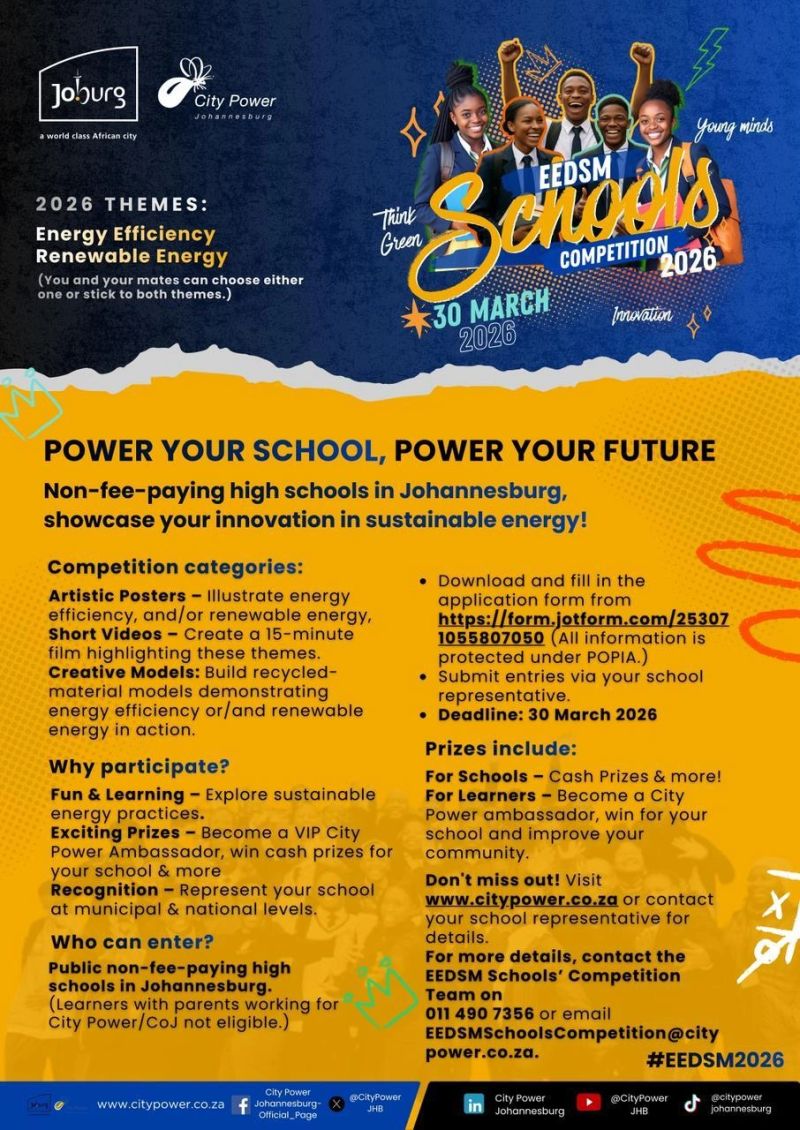By Prof. Busisiwe Mavuso
- Eskom has returned to profitability for the first time in eight years, posting a profit before tax of R23.9 billion for the 2025 financial year.
- The significant reduction in load shedding in 2025, has improved electricity supply reliability and boosted Eskom’s revenue.
- Eskom’s turnaround has been supported by over 350 private sector experts mobilised by the National Electricity Crisis Committee, contributing more than 12,000 hours of expertise.
- Despite these gains, challenges remain, including a municipal debt increase of 27% to R94.6 billion, delayed clean audit opinions due to compliance issues and targets for the energy availability factor yet to be met.
Eskom’s return to profitability after eight years offers some welcome positive news for the power utility and the broader economy. I want to congratulate Eskom for its financial results released last month, which showed it made a profit before tax of R23.9bn. It is the first time the utility has posted a profit in eight years. I was impressed that this was achieved not just from higher tariffs, but from a fundamental and significant improvement in the operations of the state-owned entity.
Load shedding was damaging to Eskom for many reasons, but one obvious consequence was that it had less electricity to sell and therefore less revenue it could earn. It also meant that Eskom ran its diesel-based open-cycle gas turbines much more, which cost considerably more than its other electricity production. The significant improvement in performance of its main fleet has enabled it to not only be a more reliable supplier of electricity, but also to use the OCGTs much less. The reduction in load shedding, while hugely beneficial to the whole economy, has also been good for Eskom’s revenue. Profits were also substantially helped by a favourable settlement with Sars over fuel levy rebates, which accounted for half the total. Overall, Eskom managed to grow revenue by 15% while reducing the cost of primary energy by 14%. That is a significant achievement and CEO Dan Marokane and the board deserve congratulations.
The performance improvement has been helped considerably by the National Electricity Crisis Committee and efforts to support the improvement in plant performance. Over 350 private sector experts were mobilised through Necom and they have put over 12,000 hours of expertise into Eskom and other companies in the electricity supply value chain. Eskom’s turnaround plan has been a partnership with the SOE, involving Necom, the ministry of electricity and energy and many other parts of government. The 98% reduction in load shedding between 2023 and 2025 is the fruit of this effort.
Of course, not everything has been achieved. Eskom’s energy availability factor, which improved from 54.6% in 2024 to 60.6% was still behind the target for the year of 65%. Next year, the target is 70%, so much more effort is going to be required.
The other major concern is municipal debt levels. These climbed 27% during the period to R94.6bn. The hard work that National Treasury has put into the municipal debt relief programme is not resulting in an improvement in municipal payments. One astounding statistic in its integrated annual report is that average debtor days for municipalities is now at a record 216. Ten years ago, it was 43 days. This is a serious problem that goes way beyond Eskom. The utility will never be able to achieve financial stability when a large part of its customer base simply doesn’t pay.
It requires systemic change to turn around performance, effectively a direct intervention in how municipalities manage their finances to enforce payment to Eskom before the revenues that are collected from electricity distribution are used for anything else. But it also needs improvements in collections at municipal level, which will require technical support. Enforcing payment is complex, but it is a problem that cannot be wished away. Government is focused on finding solutions and we will be there to support where we can.
The other negative in the financial results is that Eskom’s auditors again had a qualified audit opinion on the financial statements. This is despite Eskom having set up an audit recovery programme after the 2024 audit resulted in a qualification. Clean audits are the minimum expectation that the public should have for the performance of state institutions. It is fundamental to be able to rely on the numbers. But while the qualification is a distinct negative, there has been an improvement and this year’s is narrowly focused on Eskom’s compliance with the Public Finance Management Act, particularly records regarding losses due to criminal conduct in the year. This is a requirement that private sector companies would not have to meet. It is important that Eskom continues to improve record keeping to avoid a similar outcome next year. That would be another significant achievement. As it is, there has been a major improvement in losses related to crime, fraud and corruption and systems have been considerably strengthened.
On the whole, this year’s results show that Eskom is getting a grip on its many performance challenges, with significant improvements in many areas of how the utility is run. That can start to rebuild confidence from the public and other stakeholders that the SOE has a clear future as an efficient and competitive electricity producer. The improved financial performance also gives it a path toward being able to raise debt in the markets to support investment in capacity. Thanks to this year’s performance, that is now looking feasible, provided the municipal debt issues can be dealt with.
The unbundling of Eskom is proceeding, though not with the urgency I would like to see. During the year, the National Transmission Company of South Africa began trading as an independent business within Eskom. It will become the centre of the electricity system with multiple generators of electricity supplying it. Eskom notes that several regulatory dependencies remain to be fulfilled, though it is critical that all role players act with urgency. Eskom’s commitment to seeing through this process must be steadfast.
Eskom also recognises that the double-digit tariff increases it has experienced over the last several years cannot go on. It is taken as a given that it will see single digit increases in future and must manage its costs accordingly. Its financials show that the amount it earns per kWh is now more than double what it was six years ago. That cannot happen again. Indeed, a competitive market of the future must aim to push prices for consumers down.
The Eskom turnaround has positive macroeconomic implications, in providing stable electricity to the economy, but also in reducing the fiscal risks to the state. That can translate into improved overall creditworthiness of the state and with it, improved credit ratings. All South Africans are already benefitting from a more reliable power supply and the confidence that brings to investment and economic activity.
This year’s results demonstrate that operational excellence and financial discipline are achievable at Eskom when there is sustained focus and partnership between the utility, government and the private sector. The challenges that remain, particularly municipal debt, are significant, but they are not insurmountable if approached with the same determination that has delivered the improvements we’ve seen this year. CEO Dan Marokane and his team have earned the breathing room to tackle these remaining issues. Business stands ready to continue supporting this progress, because Eskom’s success is foundational to South Africa’s economic future.










